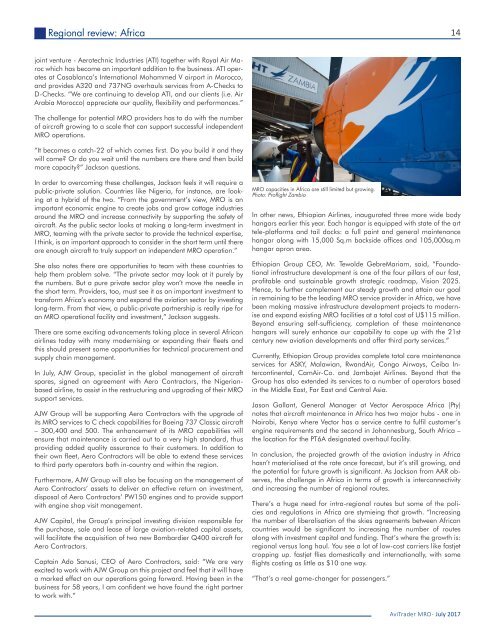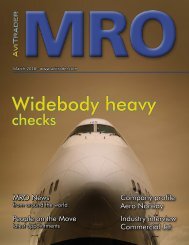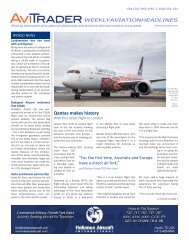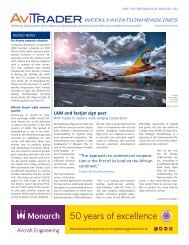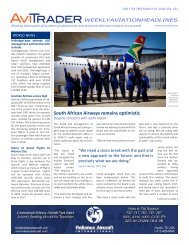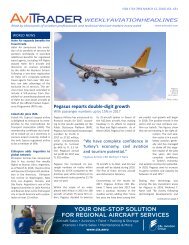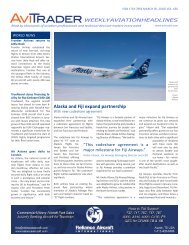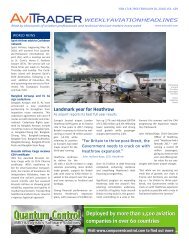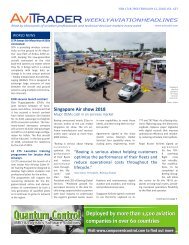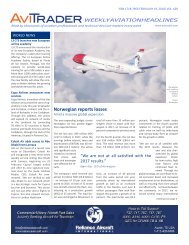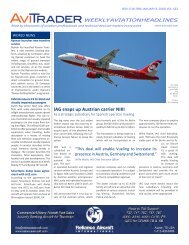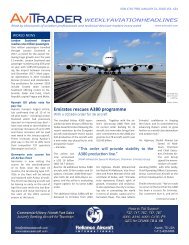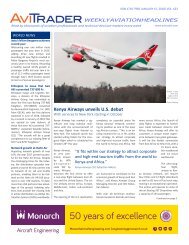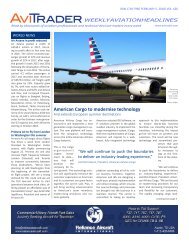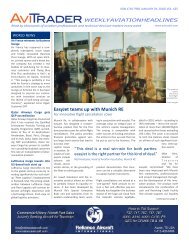You also want an ePaper? Increase the reach of your titles
YUMPU automatically turns print PDFs into web optimized ePapers that Google loves.
Regional review: Africa<br />
14<br />
joint venture - Aerotechnic Industries (ATI) together with Royal Air Maroc<br />
which has become an important addition to the business. ATI operates<br />
at Casablanca’s International Mohammed V airport in Morocco,<br />
and provides A320 and 737NG overhauls services from A-Checks to<br />
D-Checks. “We are continuing to develop ATI, and our clients (i.e. Air<br />
Arabia Morocco) appreciate our quality, flexibility and performances.”<br />
The challenge for potential <strong>MRO</strong> providers has to do with the number<br />
of aircraft growing to a scale that can support successful independent<br />
<strong>MRO</strong> operations.<br />
“It becomes a catch-22 of which comes first. Do you build it and they<br />
will come? Or do you wait until the numbers are there and then build<br />
more capacity?” Jackson questions.<br />
In order to overcoming these challenges, Jackson feels it will require a<br />
public-private solution. Countries like Nigeria, for instance, are looking<br />
at a hybrid of the two. “From the government’s view, <strong>MRO</strong> is an<br />
important economic engine to create jobs and grow cottage industries<br />
around the <strong>MRO</strong> and increase connectivity by supporting the safety of<br />
aircraft. As the public sector looks at making a long-term investment in<br />
<strong>MRO</strong>, teaming with the private sector to provide the technical expertise,<br />
I think, is an important approach to consider in the short term until there<br />
are enough aircraft to truly support an independent <strong>MRO</strong> operation.”<br />
She also notes there are opportunities to team with these countries to<br />
help them problem solve. “The private sector may look at it purely by<br />
the numbers. But a pure private sector play won’t move the needle in<br />
the short term. Providers, too, must see it as an important investment to<br />
transform Africa’s economy and expand the aviation sector by investing<br />
long-term. From that view, a public-private partnership is really ripe for<br />
an <strong>MRO</strong> operational facility and investment,” Jackson suggests.<br />
There are some exciting advancements taking place in several African<br />
airlines today with many modernising or expanding their fleets and<br />
this should present some opportunities for technical procurement and<br />
supply chain management.<br />
In July, AJW Group, specialist in the global management of aircraft<br />
spares, signed an agreement with Aero Contractors, the Nigerianbased<br />
airline, to assist in the restructuring and upgrading of their <strong>MRO</strong><br />
support services.<br />
AJW Group will be supporting Aero Contractors with the upgrade of<br />
its <strong>MRO</strong> services to C check capabilities for Boeing 737 Classic aircraft<br />
– 300,400 and 500. The enhancement of its <strong>MRO</strong> capabilities will<br />
ensure that maintenance is carried out to a very high standard, thus<br />
providing added quality assurance to their customers. In addition to<br />
their own fleet, Aero Contractors will be able to extend these services<br />
to third party operators both in-country and within the region.<br />
Furthermore, AJW Group will also be focusing on the management of<br />
Aero Contractors’ assets to deliver an effective return on investment,<br />
disposal of Aero Contractors’ PW150 engines and to provide support<br />
with engine shop visit management.<br />
AJW Capital, the Group’s principal investing division responsible for<br />
the purchase, sale and lease of large aviation-related capital assets,<br />
will facilitate the acquisition of two new Bombardier Q400 aircraft for<br />
Aero Contractors.<br />
Captain Ado Sanusi, CEO of Aero Contractors, said: “We are very<br />
excited to work with AJW Group on this project and feel that it will have<br />
a marked effect on our operations going forward. Having been in the<br />
business for 58 years, I am confident we have found the right partner<br />
to work with.”<br />
<strong>MRO</strong> capacities in Africa are still limited but growing.<br />
Photo: Proflight Zambia<br />
In other news, Ethiopian Airlines, inaugurated three more wide body<br />
hangars earlier this year. Each hangar is equipped with state of the art<br />
tele-platforms and tail docks: a full paint and general maintenance<br />
hangar along with 15,000 Sq.m backside offices and 105,000sq.m<br />
hangar apron area.<br />
Ethiopian Group CEO, Mr. Tewolde GebreMariam, said, “Foundational<br />
infrastructure development is one of the four pillars of our fast,<br />
profitable and sustainable growth strategic roadmap, Vision 2025.<br />
Hence, to further complement our steady growth and attain our goal<br />
in remaining to be the leading <strong>MRO</strong> service provider in Africa, we have<br />
been making massive infrastructure development projects to modernise<br />
and expand existing <strong>MRO</strong> facilities at a total cost of U$115 million.<br />
Beyond ensuring self-sufficiency, completion of these maintenance<br />
hangars will surely enhance our capability to cope up with the 21st<br />
century new aviation developments and offer third party services.”<br />
Currently, Ethiopian Group provides complete total care maintenance<br />
services for ASKY, Malawian, RwandAir, Congo Airways, Ceiba Intercontinental,<br />
CamAir-Co. and Jambojet Airlines. Beyond that the<br />
Group has also extended its services to a number of operators based<br />
in the Middle East, Far East and Central Asia.<br />
Jason Gallant, General Manager at Vector Aerospace Africa (Pty)<br />
notes that aircraft maintenance in Africa has two major hubs - one in<br />
Nairobi, Kenya where Vector has a service centre to fulfil customer’s<br />
engine requirements and the second in Johannesburg, South Africa –<br />
the location for the PT6A designated overhaul facility.<br />
In conclusion, the projected growth of the aviation industry in Africa<br />
hasn’t materialised at the rate once forecast, but it’s still growing, and<br />
the potential for future growth is significant. As Jackson from AAR observes,<br />
the challenge in Africa in terms of growth is interconnectivity<br />
and increasing the number of regional routes.<br />
There’s a huge need for intra-regional routes but some of the policies<br />
and regulations in Africa are stymieing that growth. “Increasing<br />
the number of liberalisation of the skies agreements between African<br />
countries would be significant to increasing the number of routes<br />
along with investment capital and funding. That’s where the growth is:<br />
regional versus long haul. You see a lot of low-cost carriers like fastjet<br />
cropping up. fastjet flies domestically and internationally, with some<br />
flights costing as little as $10 one way.<br />
“That’s a real game-changer for passengers.”<br />
<strong>AviTrader</strong> <strong>MRO</strong> - July <strong>2017</strong>


